Best Substitutes For White Wine Vinegar

White wine vinegar is a versatile ingredient commonly used in various dishes, including dressings, marinades, and sauces. However, there may be times when you run out of this essential ingredient in your kitchen pantry. Don’t worry; there are several substitutes for white wine vinegar that can still give your dishes a tangy and acidic flavor.
In this article, we will explore the best substitutes for white wine vinegar, how to choose the right one, tips for cooking with these substitutes, and some delicious recipes that utilize these alternatives. So let’s dive in!
Key Takeaways
- White wine vinegar is a staple ingredient in many dishes, but there are alternatives available when you don’t have it on hand.
- Substitutes for white wine vinegar include apple cider vinegar, champagne vinegar, rice vinegar, and lemon juice.
- When choosing a substitute, consider the flavor profile and acidity level required for your recipe.
- Cooking with substitutes may alter the taste slightly, so it’s important to adjust the quantities accordingly.
- Storage and shelf life of substitutes vary, so be sure to check the expiration dates and follow storage guidelines.
Why You Need A Substitute For White Wine Vinegar
There are several reasons why you might need a substitute for white wine vinegar. The most common reason is when you run out of it or don’t have it readily available in your kitchen. It’s always helpful to have alternative options to keep the cooking process smooth and uninterrupted.
Another reason is the flavor profile. While white wine vinegar adds acidity and tanginess to dishes, it also possesses a subtle fruitiness and mild flavor. Depending on your preference or dietary restrictions, you may need a substitute that provides a similar taste or complements the ingredients in your recipe.
Types Of Substitutes For White Wine Vinegar
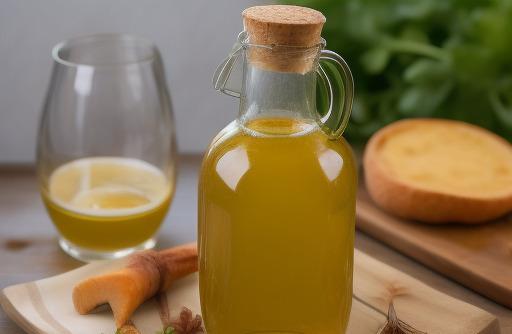
When looking for a substitute for white wine vinegar, it’s essential to consider the acidity level and flavor profile of the alternative. Here are some common substitutes you can use:
-
Apple Cider Vinegar: Apple cider vinegar is made from fermented apple juice. It has a similar level of acidity to white wine vinegar and carries a slightly sweet and fruity flavor. It works well in dressings, marinades, and sauces.
-
Champagne Vinegar: Made from fermented champagne, this vinegar is commonly used in gourmet cooking. It has a delicate and mild flavor, similar to white wine vinegar, making it an excellent substitute in recipes that require a subtle taste.
-
Rice Vinegar: Rice vinegar is a popular ingredient in Asian cuisine. It has a milder flavor and less acidity than white wine vinegar, but it can still provide the necessary tanginess to your dishes. It works particularly well in stir-fries, sushi rice, and Asian-inspired dressings.
-
Lemon Juice: Lemon juice is a readily available and affordable substitute for white wine vinegar. It adds a bright and citrusy flavor to your dishes. Due to its high acidity, it’s important to use it sparingly and adjust the quantities accordingly.
Best Substitutes For White Wine Vinegar
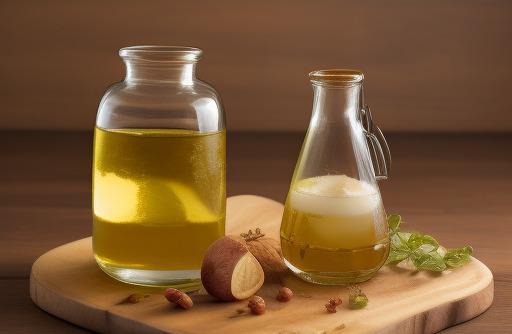
Now, let’s take a closer look at the best substitutes for white wine vinegar and how they can be used in various dishes.
1. Apple Cider Vinegar
Apple cider vinegar, with its fruity undertones and similar acidity level, is an excellent substitute for white wine vinegar. It’s widely available and can be used in a variety of recipes. Here’s how you can use apple cider vinegar as a substitute:
- In salad dressings: Replace the white wine vinegar with an equal amount of apple cider vinegar. It will add a hint of fruity flavor to your dressings.
- In marinades: Use apple cider vinegar as a replacement in marinades for meat, poultry, or fish. Its tangy and slightly sweet taste works well with these protein options.
- In sauces: Apple cider vinegar can be used in sauces such as BBQ sauce or sweet and sour sauce, adding a depth of flavor and acidity.
2. Champagne Vinegar
Champagne vinegar is a refined substitute that closely mimics the mild flavor of white wine vinegar. Here’s how you can incorporate champagne vinegar into your recipes:
- In delicate dressings: Use champagne vinegar in delicate vinaigrettes or dressings where a subtle taste is desired. Its mild flavor won’t overpower other ingredients.
- In seafood dishes: Champagne vinegar pairs well with seafood dishes such as ceviche or seafood salads. It adds a touch of sophistication while enhancing the freshness of the seafood.
- In creamy sauces: Replace white wine vinegar with champagne vinegar in creamy sauces like béarnaise or hollandaise. It will add a subtle tanginess without overpowering the richness of the sauce.
3. Rice Vinegar
Rice vinegar, commonly used in Asian cuisine, can be a suitable substitute for white wine vinegar. It has a milder flavor and is less acidic, but it can still add the necessary tanginess to your dishes. Here’s how you can use rice vinegar as a substitute:
- In Asian-inspired dressings: Replace white wine vinegar with rice vinegar in dressings for slaws, cucumber salads, or sesame ginger dressings. It will provide the characteristic tanginess of Asian cuisine.
- In stir-fries: Rice vinegar can be used to add acidity and flavor to stir-fries. Add a splash of rice vinegar during the cooking process to balance out the flavors.
- In sushi rice: When making sushi at home, rice vinegar is an essential ingredient to season the rice. If you don’t have white wine vinegar, rice vinegar can be a great alternative to achieve the desired flavor.
4. Lemon Juice
Lemon juice is an easily accessible and versatile substitute for white wine vinegar. It provides a bright and citrusy flavor to your dishes. Here’s how you can use lemon juice as a substitute:
- In salad dressings: Replace white wine vinegar with lemon juice in dressings for green salads, coleslaws, or Greek salads. The citrusy notes will elevate the freshness of the salads.
- In marinades: Lemon juice works well as a substitute in marinades, especially for chicken or fish. Its acidity helps tenderize the proteins while imparting a tangy taste.
- In sauces and soups: Lemon juice can be used in sauces and soups to add a refreshing twist. It pairs particularly well with seafood-based sauces or vegetable soups.
Choosing The Right Substitute For White Wine Vinegar
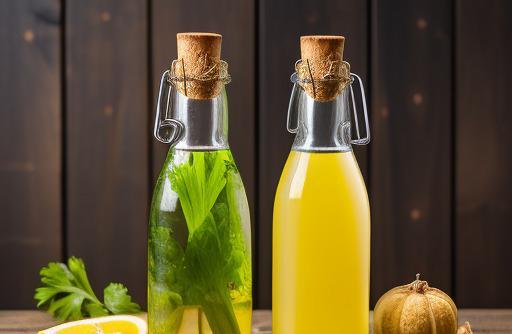
When choosing a substitute for white wine vinegar, consider the flavor profile and acidity level required for your recipe. Take note of the intensity of the flavor and adjust the quantities accordingly. Here are a few things to consider when selecting a substitute:
-
Acidity Level: White wine vinegar has a moderate level of acidity. If your recipe specifically demands this level of acidity, try to choose a substitute with a similar acid content to maintain the balance of flavors. Apple cider vinegar and champagne vinegar are great options in this case.
-
Flavor Profile: White wine vinegar has a subtle fruitiness and mellow taste. If you want to maintain or mimic this flavor profile, opt for substitutes like champagne vinegar or apple cider vinegar.
-
Recipe Compatibility: Consider the type of dish you are preparing. Certain substitutes may be more suitable for specific dishes or cuisines. For example, rice vinegar works well in Asian-inspired dishes, while lemon juice is versatile and can be used in various cuisines.
It’s important to remember that while substitutes can closely mimic the flavors of white wine vinegar, they may still alter the taste of the final dish slightly. Experimentation and adjustments may be necessary to achieve the desired results.
Pro Tip: When substituting white wine vinegar, start with a smaller quantity of the substitute and gradually add more to taste. This allows you to adjust the flavor without overpowering the dish.
Cooking With Substitutes For White Wine Vinegar
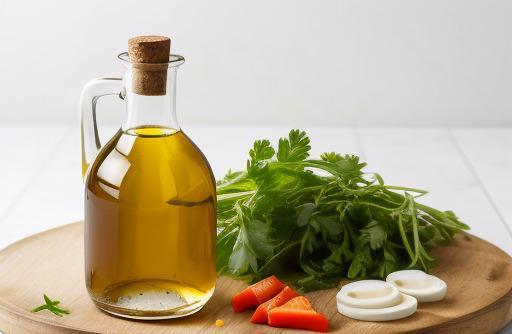
Cooking with substitutes for white wine vinegar requires some careful consideration to achieve the desired results. Here are a few tips to keep in mind:
-
Taste Testing: Before adding the substitute to your recipe, taste it on its own. This will give you an idea of the flavor profile and acidity level. Adjust the quantity accordingly to avoid overpowering or diluting the flavors.
-
Adjusting Quantities: Since substitutes may have different levels of acidity, you may need to adjust the quantities in your recipe. Start with a smaller amount and gradually add more if needed. Remember, it’s easier to add more than to subtract.
-
Flavor Pairings: Consider the other ingredients in the dish and how they will interact with the substitute. Choose a substitute that complements the overall flavor profile of the recipe. For example, if you are making a Mediterranean-inspired dish with olives and feta cheese, lemon juice can be a suitable substitute due to its compatibility with those flavors.
-
Experimentation: Cooking is all about experimentation, so don’t be afraid to try different substitutes and adjust the quantities according to your taste preferences. This will help you discover new flavor combinations and make the dish your own.
Recipes Using Substitutes For White Wine Vinegar
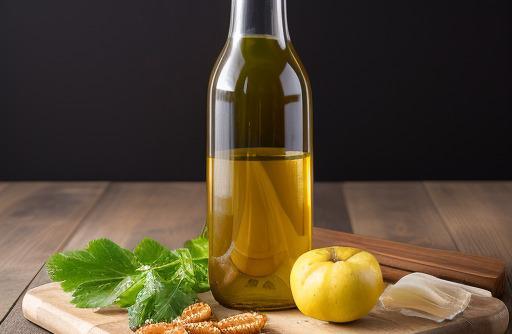
Now that you know about the best substitutes for white wine vinegar, let’s explore some delicious recipes that you can make with these alternatives:
Apple Cider Vinaigrette
Ingredients:
- 2 tablespoons apple cider vinegar
- 2 tablespoons extra virgin olive oil
- 1 teaspoon Dijon mustard
- 1 teaspoon honey
- Salt and pepper to taste
Instructions:
- In a small bowl, whisk together apple cider vinegar, olive oil, Dijon mustard, honey, salt, and pepper until well combined.
- Taste and adjust the quantities of the ingredients as desired.
- Drizzle the vinaigrette over your favorite green salad and enjoy.
Lemon Herb Chicken Marinade
Ingredients:
- 1/4 cup lemon juice
- 2 tablespoons olive oil
- 2 garlic cloves, minced
- 1 tablespoon chopped fresh herbs (such as thyme, rosemary, or parsley)
- Salt and pepper to taste
Instructions:
- In a bowl, whisk together lemon juice, olive oil, minced garlic, fresh herbs, salt, and pepper.
- Place the chicken in a ziplock bag or a shallow dish and pour the marinade over it.
- Marinate the chicken for at least one hour, or preferably overnight, in the refrigerator.
- Grill, bake, or pan-sear the marinated chicken until cooked through and enjoy with your favorite sides.
Rice Vinegar Asian Slaw
Ingredients:
- 4 cups shredded cabbage
- 1 cup shredded carrots
- 1/4 cup rice vinegar
- 2 tablespoons soy sauce
- 1 tablespoon sesame oil
- 1 tablespoon honey
- 1 teaspoon grated ginger
- 1 clove garlic, minced
- 2 green onions, thinly sliced
- Sesame seeds for garnish
Instructions:
- In a large bowl, combine shredded cabbage and carrots.
- In a separate bowl, whisk together rice vinegar, soy sauce, sesame oil, honey, grated ginger, minced garlic, and sliced green onions.
- Pour the dressing over the cabbage and carrots, and toss until well coated.
- Let the slaw sit for at least 10 minutes to allow the flavors to meld together.
- Sprinkle sesame seeds on top for garnish before serving.
Storage And Shelf Life Of Substitutes
The storage and shelf life of substitutes for white wine vinegar can vary depending on the specific type. Here are some general guidelines:
- Apple cider vinegar: Store in a cool, dark place, away from direct sunlight. Its shelf life is typically around two years but can be longer if properly stored.
- Champagne vinegar: Like other vinegars, store it in a cool, dark place. It can retain its quality for up to three years.
- Rice vinegar: Keep it tightly sealed in the refrigerator. It can last for about six months to a year.
- Lemon juice: Store freshly squeezed lemon juice in the refrigerator for about 2-3 days. Alternatively, you can freeze it in ice cube trays for longer storage.
Always check the labels and follow the manufacturer’s instructions for storage and shelf life to ensure that your substitutes maintain their quality and freshness.
Conclusion
When you find yourself without white wine vinegar in the kitchen, there’s no need to worry. There are several excellent substitutes available that can impart acidity and flavor to your recipes. Apple cider vinegar, champagne vinegar, rice vinegar, and lemon juice are just a few options to consider.
Remember to choose the substitute based on its flavor profile and acidity level, and don’t be afraid to experiment and adjust the quantities to your taste. By using these substitutes and following the provided recipes, you can continue creating delicious dishes even without white wine vinegar.
FAQS
What Are Some Good Substitutes For White Wine Vinegar?
Some of the best substitutes for white wine vinegar include apple cider vinegar, rice vinegar, red wine vinegar, champagne vinegar, and sherry vinegar.
Can Apple Cider Vinegar Be Used As A Replacement For White Wine Vinegar?
Yes, apple cider vinegar is a great substitute for white wine vinegar. It has a similar acidity level and a slight fruity flavor that can complement many dishes.
Is Rice Vinegar A Good Substitute For White Wine Vinegar?
Yes, rice vinegar is a popular substitute for white wine vinegar because it has a milder taste and sweeter flavor profile. It is commonly used in Asian and Korean dishes and can be a great addition to salad dressings and marinades.
What Is The Difference Between Red Wine Vinegar And White Wine Vinegar?
The main difference between red wine vinegar and white wine vinegar is their flavor profile. Red wine vinegar tends to have a stronger and more robust taste, whereas white wine vinegar has a lighter and milder flavor. However, both can be used interchangeably in some recipes.
Can Champagne Vinegar Be Used Instead Of White Wine Vinegar?
Yes, champagne vinegar is another great substitute for white wine vinegar. It has a subtle tartness and a delicate flavor that can enhance the taste of many dishes. It is often used in vinaigrettes and sauces, but can also be used for pickling and marinades.
Sources
About the Author Jenny
I'm Jenny, a housewife with an unwavering passion for food. My culinary journey began with my grandmother's kitchen, and it's now a full-fledged food blog. I've turned my love for cooking into a creative outlet, sharing recipes and stories with a global community of fellow food enthusiasts. It's proof that being a housewife can also mean pursuing your passions and savoring life's delectable moments.
